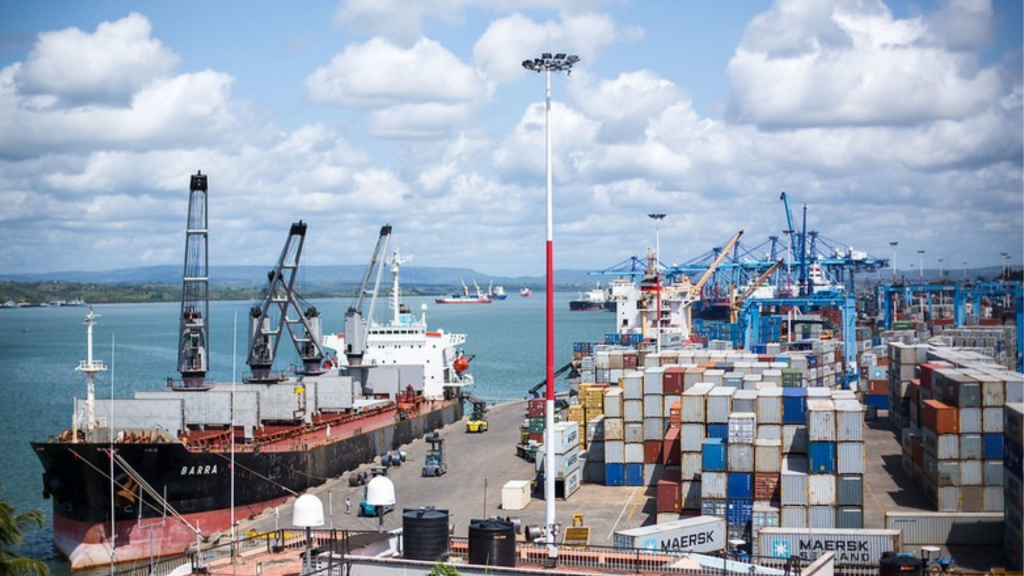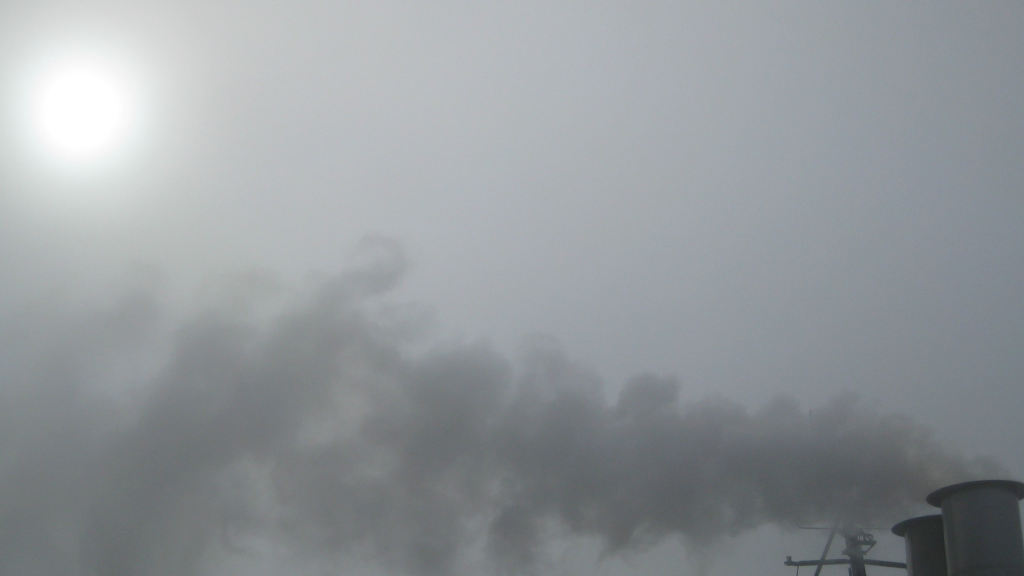By Hannah Elliott, Mwathi Kitonga, Fred Kung’u and Elvin Nyukuri

Seaports are bustling gateways for trade and the growing blue economy, handling around 80 per cent of world trade. In the Global South, ports are viewed as key drivers of economic development, reflected, for example, in the massive increase in port infrastructure investment in Africa since the mid-2000s. Beyond facilitating trade, however, Southern ports are increasingly seen as important nodes in the international maritime decarbonization effort.
Shipping’s greenhouse gas (GHG) emissions, constituting 3% of the global total, have surged by 20% over the past decade, with the industry dependent on an ageing world fleet that runs almost entirely on fossil fuels. Without intervention, emissions could soar to 130% of their 2008 levels by 2050. Decarbonization is imperative, yet the sector grapples with significant investment requirements and uncertainty surrounding the best transition methods. Unchecked emissions from the shipping industry exacerbate the planetary crisis of pollution, climate change and biodiversity loss, posing threats to coastal communities worldwide. This includes rising sea levels, intensified extreme weather events and alarming loss of marine diversity.
In response to these challenges, the International Maritime Organization (IMO), the UN regulatory body for the global shipping industry, in July 2023 unveiled a revised GHG strategy aiming for net-zero emissions by 2050, a significantly more ambitious strategy than its 2018 predecessor, whose goals did not align with the Paris Agreement’s 1.5 degrees Celsius. IMO member states are now tasked with coming up with the regulatory measures through which to achieve the new strategy, which must be agreed upon by spring 2025. These will update existing measures as currently captured in MARPOL Annex VI, which imposes limits on harmful pollutants in air emissions from ships.
Crucial to the realization of the IMO’s new strategy is the enforcement of its conventions. In principle, this is the responsibility of IMO member states, who are tasked with governing the ships they register in their capacity as flag states. However, this has proved an ineffective system due to the pervasive industry practice of ‘flagging out’, whereby ship owners register their ships in open registries hosted by countries with lenient regulations and lower taxes. Known as ‘flags of convenience’, some registries undermine the enforcement of international maritime conventions due to their tendency to play a minimal role in the governance of the ships they register.
In the context of a disjointed, uneven system of enforcement by flag states, port states are considered an important ‘safety net’ for catching non-compliant ships. Port State Control (PSC) inspections act as checkpoints to ensure compliance with international regulations set by the IMO, including the MARPOL convention. PSC activities are coordinated by regional Memorandums of Understanding (MoUs) on Port State Control, which, through standardized ship selection methods, inspection regimes, codes of conduct, training and the sharing of inspection data seek to harmonize PSC practices in port states across the world. In addition to PSC inspections, port states are seen as enablers of maritime decarbonization through facilitating efficient port calls, providing onshore power so that ships can switch off their engines while at berth, and offering low or zero carbon fuels and bunkering infrastructure.
Port states in the Global South are increasingly the focus of IMO-led initiatives to promote and support the decarbonization agenda, including through the work of regional Maritime Technology Cooperation Centres, which seek to promote technologies and operations towards decarbonization in small islands developing states and least developed countries; the IMO Cares project, which aims to facilitate decarbonization technology and knowledge transfer between the Global North and South; and GreenVoyage2050, which supports developing countries to reduce GHG emissions from shipping. The Environmental Maritime Governance in Kenya (EMG-K) project, undertaken by a consortium of researchers in Kenya and Denmark, focuses on Kenya’s engagement with IMO’s maritime decarbonization agenda. Kenya is an important port state, with Mombasa port serving as the main gateway to Uganda, Rwanda, Burundi, Democratic Republic of Congo and South Sudan. Kenya is also an important member of the IMO, having recently been reelected to the IMO Council, and is one of the most active members of the Indian Ocean Memorandum of Understanding on Port State Control, conducting regular PSC inspections on ships calling at Mombasa.
Recent fieldwork among maritime stakeholders highlights Kenya’s aspirations to be at the forefront of maritime decarbonization in the region. Kenya has proved to be a trailblazer in terms of climate regulations more broadly, being the first nation on the continent to push a national climate change bill through parliament in 2016. The country’s ambitions for its maritime sector are reflected in its Blue Economy Strategy and the establishment of a new Ministry for Mining, Blue Economy and Maritime Affairs in early 2023 under the presidency of William Ruto. Kenya is highly engaged in IMO’s decarbonization agenda: the country hosts the Maritime Technology Cooperation Centre Africa and is a participant in the IMO’s GreenVoyage2050. Kenya Ports Authority has also adopted a Green Port Policy for Mombasa port, including plans to offer onshore solar power to ships at berth along with alternative fuels.

Our ongoing research identifies a number of challenges that Kenya must grapple with if it is to realise its regulatory aspirations in practice. The country’s interest and investment in the blue economy is relatively recent, and must contend with the legacies of long-standing national neglect of the maritime sector, in particular when it comes to maritime training and expertise. Enforcement of IMO conventions via PSC inspections requires highly trained maritime professionals at the level of chief engineer or master mariner who have completed the on-the-job training on board ships known in the industry as ‘sea time’. The maritime authority faces a generation gap in their human resources, as a generation of older high-ranking seafarers who trained overseas retires and a younger generation continues to undergo training through national institutions. As a result, PSC officers are in short supply and overstretched. Furthermore, PSC officers have found that their legal scope for enforcing IMO conventions is limited. Kenya was quick to ratify MARPOL Annex VI in 2008, but is only now, with support from IMO, concluding a lengthy process of legal domestication which will enable PSC officers to operationalize the convention and sanction non-compliant ships.
Even with domestic laws in place, Kenya’s PSC regime will be faced with the tricky balancing act of enforcing IMO conventions amid commercial pressures. In part due to the lack of legal scope to enforce to date, Mombasa port has continued to attract older ships which are more likely to pollute, raising the dilemma of how to enforce environmental regulations without disrupting business. Amid a race in the region to construct world class ports, there is much political emphasis on ensuring that Mombasa remains the port of choice for international business through providing swift and efficient operations. This may militate against the stringent enforcement of environmental regulations if associated with delays. Furthermore, the prevalence of older ships calling at Mombasa makes investments in green technologies and fuels risky and uncertain as the industry awaits decisions on the new regulatory measures to achieve IMO’s 2023 GHG strategy. Our research investigates such dilemmas for this important port state at a pivotal moment for the shipping industry, generating insights into environmental maritime governance from the Global South.
To read more about EMG-K, please see the project website.
Hannah Elliott is an Assistant Professor at the Department of Management, Society and Communication, Copenhagen Business School.
Mwathi Kitonga is a PhD candidate at the Centre for Advanced Studies in Environmental Law and Policy, University of Nairobi.
Fred Kung’u is a Graduate Assistant at the Centre for Advanced Studies in Environmental Law and Policy, University of Nairobi.
Elvin Nyukuri is a Senior Lecturer at the Centre for Advanced Studies in Environmental Law and Policy, University of Nairobi.
Picture Sources:
Picture 1: https://www.flickr.com/photos/meaact/19720060734/
Picture 2: René
